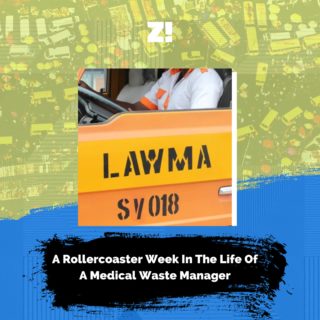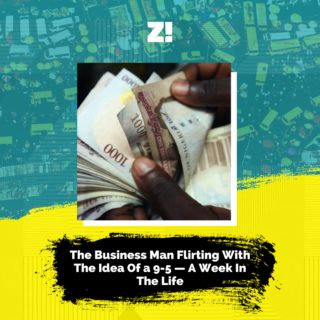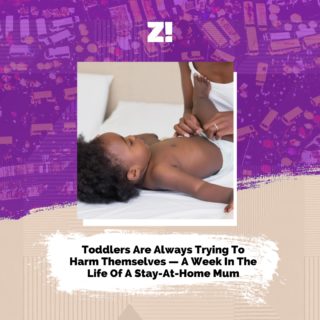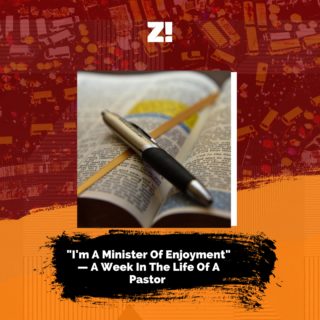What does it mean to be a man? Surely, it’s not one thing. It’s a series of little moments that add up.
“Man Like” is a weekly Zikoko series documenting these moments to see how it adds up. It’s a series for men by men, talking about men’s issues. We try to understand what it means to “be a man” from the perspective of the subject of the week.
The subject for today is Victor, and he’s the managing editor of TechCabal. He talks about the struggles of growing up effeminate, the challenges of toxic masculinity and what it means to be human.
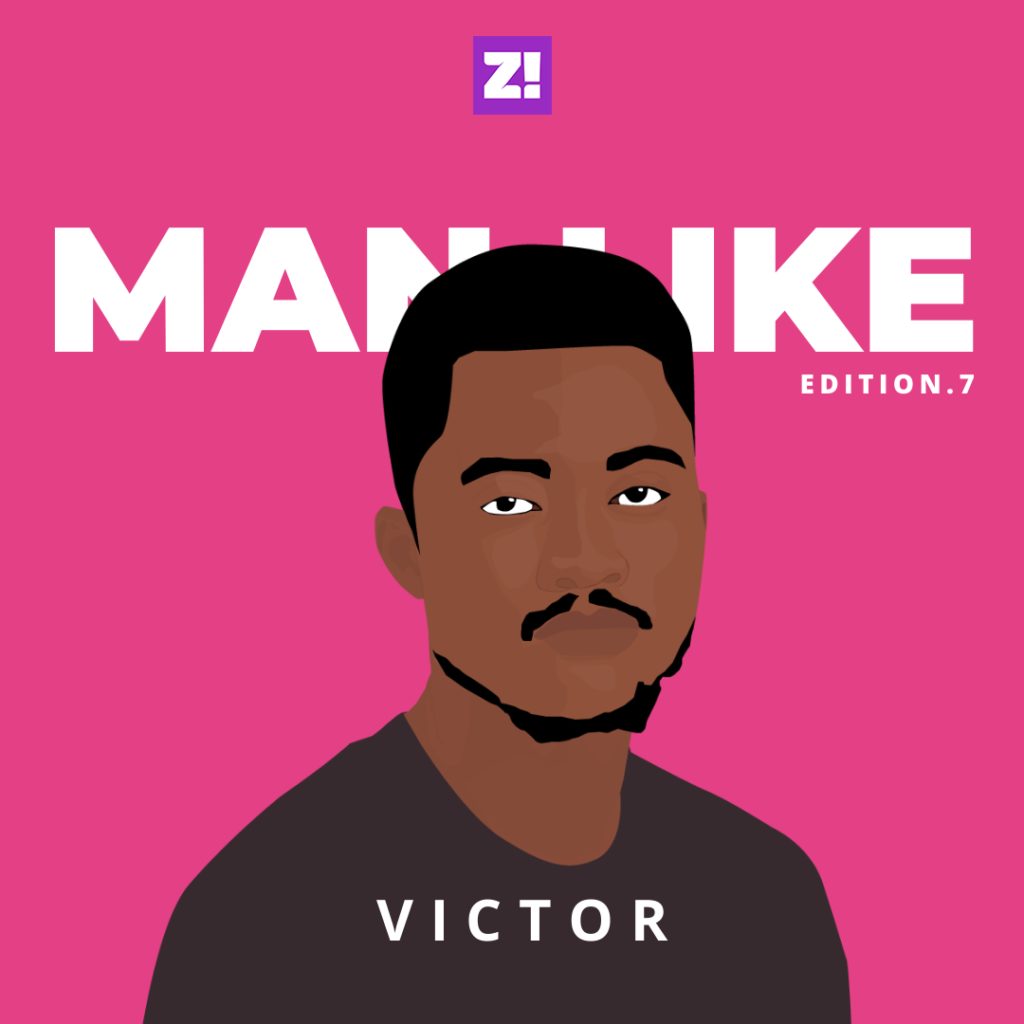
When did it first dawn on you that you were now a “man”?
[Pause]
The reverse to your question is that was I ever a child and the answer is no. I‘ve been responsible for stuff for the longest time. As early as eight years old, my mother would leave my siblings with me to take care of. I remember changing my sister’s napkins and her just crying. It was on one of these occasions that I cooked rice for the first time without supervision. I don’t remember the details, but the cry just full everywhere, so I had to do something.
After then, I graduated into worrying about family and stuff. I was very anxious — how’s the family going to be? What does the future look like? How would my siblings fare? This manifested in such a way that I went from thinking to going to look for work. It didn’t help that I was the first child, so there were expectations vs reality vs trying. I pulled nine million other stunts in the name of hustle and trying to contribute in my own way.
Mahn. Do you remember your first job?
It was a mixture of things: I worked at a bookstore for a while. I also worked at construction sites doing manual labour. I think there was also work in a factory as a factory hand.
When I was doing these things, my age mates were not working. We’d just finished school, and they were carrying babes, but I had the mindset of “what would I do next?” How would I apply myself? I guess that’s what drove me.
What’s something growing up like this does to you?
I’ll talk about relationships — I’ve noticed that I’m always the carer. I’m the one worrying about the other person’s physical and emotional wellbeing. And it happens by default. I think my childhood of looking after people influences this behaviour.
Interesting.
What’s interesting is that I once dated someone that said I was going to have a midlife crisis because I didn’t have a childhood. The person was like I skipped some developmental phases, and it’d affect me. I don’t remember having the time or the mental luxury to play like a child. I can’t remember being a child.
Did you ever talk to your parents about this?
I had a period in my life when I was angry. As a teenager, I was angry at the world, angry at Nigeria, angry at my parents. The anger reflected in a lot of things. I was more physical; I had a temper problem, and I was just very angry.
However, the more experienced I got, the more I saw life from a different perspective. You’ve been born, and nobody owes you anything. I started to understand that I was in charge of my life to a large extent. I also strongly believe in God and the place of luck and chance in people’s destiny. The belief that my actions would be responsible for a lot of things helped my anger and resentment. The older I got, the more I saw my parents as human beings with their own flaws. By the time we started to talk, it was from a place of understanding.
And your siblings?
I practically brought up my sisters. They were like my practise family. Until recently, I was very hands-on with them. I was trying to map their direction. I love the process of ageing and learning because it gives you perspective, and you see the world differently. I have come to accept that people will make decisions you don’t agree with and they’ll also be fine. My role is to support them. I love them very much, and I’m there for them to the extent that I can. Now, we chat, we text and all have a cordial relationship.
Nice. What gives you joy?
I think it’s important to make a distinction between joy and happiness. Someone like me, I can be happy at will. In making others happy, I’m happy. However, I think joy is one of those internal struggles that a human being embarks on until they die. Joy is a lifelong journey and there’s not one destination or route to it. I’m optimistic and at peace. I’m the kind of person who thinks that if I’m alive, the future will be fine. Inner peace for me is like a precursor to some form of joy because the pursuit is an unending one.
Philosopher, please. Does anything scare you?
Because of how I was brought up… I wasn’t brought up
I’m more familiar with uncertainty. Uncertainty is exciting for me because I’m like, what does the future hold? There’s this thing in life where you make plans and it falls through. The knowledge that your well-stacked chips can just fall down is a vulnerable state; it sets uncertainty that’s akin to fear. It’s a blurry line between fear, excitement and uncertainty. I try not to think about it as fear, and I think that’s me being international in a Zen-like way.
I’m curious. Who are your role models?
Growing up, it was my dad. I had a great relationship with him, and he was instrumental to a lot of things. He introduced me to sports, creativity, and working out. But we weren’t always together. Somewhere along my late teens, separation happened, and he was no longer in the picture.
One of the biggest sources of my anger [growing up] was that I didn’t have anybody. At one point, when I was modelling, I wished there was someone to guide me. Most things I did in my life was basically just figuring shit out by myself — I’d just rough the thing. I’d read where I had to read. In other places, I’d put my head there and combine with hard work, smart work, God’s grace and luck. I honestly know that if I had guidance, I’d have gotten a lot of things “right.” In retrospect, it doesn’t matter because I think everything worked out the way God wanted it to.
Mahn…
The experience formed the way I looked at role models growing up. I’d scoff at people who had role models. It’s ironic because I grew up needing these people. And by not having it, a defence mechanism came up. Growing older and wiser, I’ve realised that you need models: mental models and human models. And if you don’t have physical access, you can learn from them over the internet.
I have a tonne of role models. People blog and tweet and I know it’s not their life, but I’m like: I like this model of you and what you made of your career. Teach me how you did it. But I don’t need to talk to you. I’ll read your book, your blog or your tweets. My work also gives me access to talk to people, so I can throw in a question and learn from the person’s experience. Life for me has become like the role model — a mental model of everybody. It’s not intentional, it’s just circumstantial, and I’ve made the best of it. I want to have things like career mentors that I talk to about my career. But I’m afraid, and I don’t want to bother someone. At the back of my mind, there’s still that inhibition that I’m being a bother.
At the end of the day, I’m still growing every day and trying to be better.
Heavy stuff. What was the hardest part of growing up as a man in Nigeria?
One day, I’m going to write about how toxic masculinity is the worst thing that can happen to a boy child. In my early teens, I was effeminate. My earliest memories involved singing — I sang soprano. I read books and carried novels everywhere. I got a lot of “Why you dey waka like a woman?” “Why you dey carry book like woman?” — this is gay.
Growing up in Nigeria, there’s a lot of expectations of you to be manly. Most of it is societal norms that you are forced to conform to. I’ve heard people say it’s wrong for a man to rub cream like a girl, and they should do “like man.”
I rebel against many definitions of manhood. For example, being a man doesn’t mean that when we’re gathered, we have to talk about who dey toast this one or who slept with this one. It stresses me out that there are adults still having that conversation. I’m talking about professionals. It’s stressful because it means that I can’t relate to a lot of young people who grew up this way.
I don’t want to be talking to you and the only thing we talk about is Arsenal and Chelsea. There are nine million other things for us to discuss and a world of interest that you probably have if you paid attention. But because your definition of being a man dictates that these are the things you talk about, we have to talk about them.
I feel you.
Being a man in Nigeria means being emotionally stunted. It’s just too much burden to place on one person. There are all these moulds in our mind that have nothing to do with manliness. You’re first human before you’re a man. If you start losing your identity because you’re attempting to fit into a societal male cast, then you have a problem.
Not every man is built to have a square chest, broad shoulders and slim hips. Some men are genetically built to have a big stomach, barrel bodies no matter how much they work out. Someone with a potbelly is not less of a man than I am.
I think the Nigerian definition of manliness is dangerous. Men think they own women or that they’re superior. These stereotypes make you believe that you own the world. And by fitting into this cast, you’re the king of the world; nobody can tell you nothing or sit with you. Then you grow up to become a shit human. You should be human before being a man.
Word. Tell me a major transformation that has happened between growing up and now.
I eventually grew up to be masculine, and became really sporty and athletic; I played basketball, did boxing, lifted weights. All these were antithetical to when I was younger where I had a lot of side comments to deal with.
At that age, I was impressionable, so the comments shook me to the core. This is one of the reasons why I can’t say this is what it means to be masculine. It took me a while to know that masculinity is not my identity. I’m Victor, and I’m human. I am kind and compassionate. I have the will to thrive. I’m a warrior and a survivor. There’s Victor from my early teens and there’s the current one, and both of them are masculine.
Sweet. What makes you human?
MR NIGER D, and then empathy.
Check back every Sunday by 12 pm for new stories in the “Man Like” series. If you’d like to be featured or you know anyone that would be perfect for this, kindly send an email.

